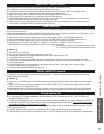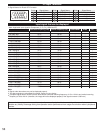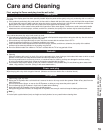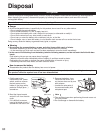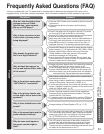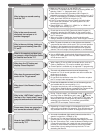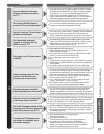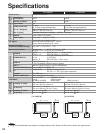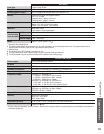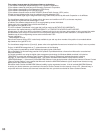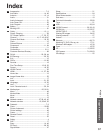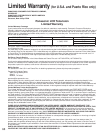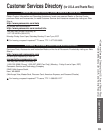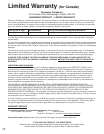
65
Support Information
Specifications
3D Eyewear
Lens type
Liquid Crystal Shutter
Usage temperature range
32°F - 104°F (0 °C - 40 °C)
Charging power supply
DC 5 V (supplied by USB terminal of a Panasonic TV)
Battery
Lithium-ion polymer rechargeable battery
DC 3.7 V, 70 mAh
Operation time*
1
: Approx. 30 hours
Charging time*
1
: Approx. 2 hours
Viewing range*
2
Transmitter for 3D Eyewear
Within 10’5” (3.2 m) from front surface
(Within ± 35° horizontal, ± 20° vertical)
Materials
Main body: Resin
Lens section: Liquid crystal glass
Dimensions
(not including
nose pad part)
Width
6.70 ” (170.1 mm)
Height
1.63 ” (41.2 mm)
Overall length
6.69 ” (169.8 mm)
Mass
Approx. 0.09 lb. (Approx. 39 )
*
1
Operation time/charging time
The battery deteriorates after repeated use, and the operation time eventually becomes short. The figures above are at
shipping from the factory, and are not a guarantee of performance.
*
2
Viewing range
The location of the 3D Eyewear transmitter (p. 12)
There are differences in the viewing range of the 3D Eyewear among individuals.
The 3D Eyewear may not operate correctly at the outside of the viewing range.
Wireless LAN Adapter
Power supply
DC 5V (USB powered) 500mA
Antenna
Tx 1, Rx 2
Interface
USB 2.0
Standard Compliance
IEEE802.11n / IEEE802.11a / IEEE802.11g / IEEE802.11b
Transmission system
MISO-OFDM system, OFDM system, DSSS system
Frequency Range
IEEE802.11n / IEEE802.11a :
5.150GHz - 5.725 GHz for EU Countries
5.150GHz - 5.850 GHz for USA, Canada
5.250GHz - 5.850 GHz for Taiwan
IEEE802.11g / IEEE802.11b / IEEE802.11n:
2.412 GHz - 2.472 GHz for EU countries
2.412 GHz - 2.462 GHz for USA, Canada, Taiwan
Transfer rate (standard) *
IEEE802.11n: Tx Max. 150Mbps, Rx Max. 300Mbps
IEEE802.11g / IEEE802.11a: Max. 54Mbps
IEEE802.11b: Max. 11Mbps
Access Mode
Infrastructure mode
Security
WPA2-PSK (TKIP/AES)
WPA-PSK (TKIP/AES)
WEP (64bit/128bit)
Dimension (WxHxD)
1.18 ” x 0.42 ” x 3.73 ” ( 30.00 mm x 10.72 mm x 94.85 mm)
Mass
0.88 oz (25 ) Net
* Transfer rates are theoretical values; however, actual communication rate will vary according to communication environment or
connected equipment.



